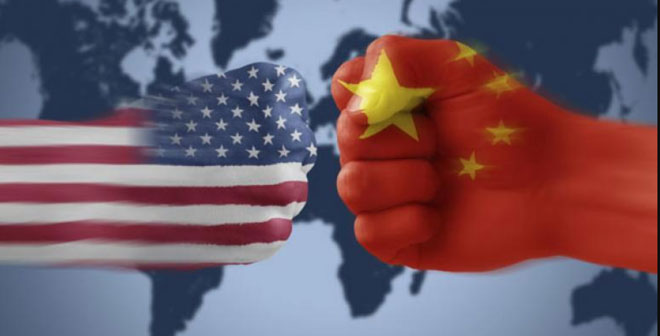
Houston (Platts)
**China may offer US sanctions compliance for trade concessions
**Chinese imports of Iranian crude up 6% from 2017
**Domestic banks, barter system may be used to evade sanctions
China, Iran’s top oil consumer, will likely attempt to evade sanctions that the US has promised to reimpose in November, but ongoing trade disputes and sensitive diplomatic talks could motivate Beijing into limited compliance, analysts told S&P Global Platts this week.
“I do think the Chinese are going to evade US sanctions and even just ignore some of them,” said Richard Nephew, a principal deputy coordinator for sanctions policy at the State Department during the Obama administration. “But, depending on how North Korea and other trade issues are going, they may (I must emphasize, may) throw a few bones to the Trump Administration by reducing a bit of their purchases, cooperating on this or that evasion case, etc.”
Another former State Department official said that China would not cooperate with reimposed sanctions unless they got a “big concession” from the Trump administration, likely within the brewing US-China trade war.
The seemingly unrelated trade disputes, including steel and aluminum tariffs, denuclearization talks with North Korea and the ongoing fight over control of the South China Sea, could all impact how much, or how little, China complies with US sanctions on Iran, according to Amy Myers Jaffe, director of the Council on Foreign Relations’ energy security and climate program.
“It’s hard to see that China would just shaft the United States’ concerns about Iran given the fact that there are so many other moving pieces in the China-US relationship,” Myers Jaffe said in an interview with the Platts Capitol Crude podcast. “If you’re the leadership in Beijing is this an issue you want to have a conflict with the US over given all the other things on the plate?”
Myers Jaffe, who thinks US sanctions on Iranian oil buyers could take more than 1 million b/d off the market, expects China to reach a deal with the US on reducing its Iranian imports.
US Secretary of State Mike Pompeo could discuss such a deal during a visit to Beijing scheduled for Thursday. A State Department spokeswoman declined to comment Wednesday.
In May, China imported an average of 636,548 b/d of Iranian crude and condensate, the most of any nation in the world, but down from 714,467 b/d in April, according to Platts estimates.
Through the first five months of 2018, China has imported an average of 637,121 b/d of Iranian crude, up nearly 6% from its full 2017 average of 602,259 b/d.
COOPERATION NOW LESS CLEAR
Nephew, now a senior research scholar at Columbia University’s Center on Global Energy Policy, said the Obama administration had “relatively modest expectations” of China when sanctions on Iran were imposed in 2012 under the Joint Comprehensive Plan of Action, which Trump announced last month the US was exiting.
“We expected China to reduce purchases with Iran significantly, but in keeping with their overall amounts,” Nephew said. “We expected them to resist doing big things but cooperate on policing some bad behavior on the part of their industries, and they did that too. All in all, it was a contentious relationship on this score but one that we made productive.”
But cooperation from China is less clear following the US exist from the nuclear deal, analysts said.
“They did not fully comply the last time when there was much more international consensus on the use of sanctions on Iran,” said Jane Nakano, a senior fellow in the Center for Strategic and International Studies’ energy and national security program. “The right question seems to be where along the scale of 100% compliance to 100% non-compliance China will be this time.”
It also seems to no longer be a question of whether China will evade sanctions, but how.
The former State Department official said China may “hide” their import data, possibly by masking purchases through military companies, making it difficult to determine how much Iranian crude it is bringing in. In addition, China may further move its oil purchases to Chinese renminbi and transact only through designated banks, such as its domestic Kunlun bank, the former official said.
This would create problems for both China, since it would be difficult to avoid interacting with the US financial system, and Iran, since it cannot cover expenses in Chinese renminbi currency, according to Ellen Wald, president of Transversal Consulting.
“I see a possibility that the US could waive sanctions for certain Chinese banks in return for concessions in US-China trade negotiations or further help with North Korea,” Wald said.
Wald said China and Iran may develop a payment structure outside the banking system.
“China is heavily involved in Iran in areas outside of oil. Chinese state companies are involved in revamping Iranian transit systems and have contracts for major projects and items such as subway cars,” Wald said. “It’s possible that Iran and China could work out a quasi-barter system in which Iran foregoes a currency payment for oil provided to China while China pays its own contractors to provide services for Iran.”
On Sunday, Iranian President Hassan Rouhani and Chinese President Xi Jinping agreed to enhance bilateral pragmatic cooperation and pursue comprehensive strategic partnership, according to China’s state-owned Xinhua news agency. –Brian Scheid, brian.scheid@spglobal.com
 khalijefars News, Blogs, Art and Community
khalijefars News, Blogs, Art and Community








